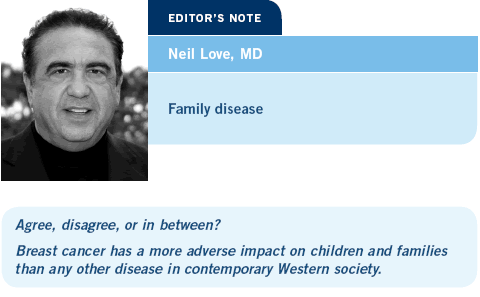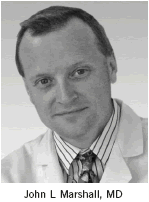
 |
||||||||

Every day, oncology infusion rooms across this country are filled with our mothers and daughters spending time away from their families, work and everyday lives to receive adjuvant chemotherapy — and hopefully a cure — for invasive breast cancer. In spite of this considerable personal and psychological sacrifice, perhaps a quarter to a third of these women will eventually succumb to the disease.
On a recent issue of our Colorectal Cancer Update audio series, GI investigator Dr John Marshall tells us what it’s like to be the husband of a woman receiving adjuvant chemotherapy for breast cancer. What our listeners cannot see is the gaunt but determined look that spread across John’s face when he verbalized his realization that after years of prescribing chemotherapy, he knew nothing about it.
 She’s lost her hair — she looks very cute, but
she’s lost her hair. She’s had mucositis, and
we’ve learned about fatigue. Picking up the
kids at school, and all the other things that
have to be done, is now a lot more complicated.
So I’m living it from that side, and I
have to tell you, it’s made me a born-again
symptom management guy.
She’s lost her hair — she looks very cute, but
she’s lost her hair. She’s had mucositis, and
we’ve learned about fatigue. Picking up the
kids at school, and all the other things that
have to be done, is now a lot more complicated.
So I’m living it from that side, and I
have to tell you, it’s made me a born-again
symptom management guy.
Two months ago, I would have said, “A little bit of mouth sores? It doesn’t prevent you from eating? You’re good.” I would have let it be, but now I see what it means.
This experience is making me a better doctor and a better dad, and I have also been amazed at the number of people who have come to our aid. Our freezer is full. I have rides for the kids anywhere. The people from work, the people from church and the people from school have all come out to help.
You know the old saying, “It takes a village”? Well, it takes a village to get through something like this, and as oncologists, we’re only seeing the two people who show up in the exam room — sometimes the one person — and what we don’t realize is the pyramid of infrastructure that it took to get patients through that cycle, get them into the next cycle and get them delivered on time with counts and all of that.
We also don’t see the ripple effect of telling people bad news. I’m pretty good at telling people bad news. We all are as oncologists, but if we felt the ripple of every piece of bad news we gave and took it home, we’d go crazy. Particularly right after my wife’s diagnosis, every time one of my patients had a bad CT or every time a biopsy was positive, I was feeling the ripple, and it was really striking.
So I’m telling Mrs Jones that she has something going on, and I see in her eyes what I felt in my own heart just a week or two earlier. Before this, I knew what I was doing as an oncologist, but I didn’t feel the magnitude of what the dinner table discussion was going to be like that night.
Having lived it now, it’s sharpened that feeling. I know I can’t maintain that intimacy 20 times a day, but hopefully it will make me even better at being sensitive and making sure that my patients get all the information they need for that dinner table conversation.
DR LOVE: So you’re more aware of your importance as a physician?
DR MARSHALL: Yes. Absolutely. Having hung on the words of your colleagues as they talk about side effects, treatment and the like, you realize just how important those words are.
Listening to John’s story, I couldn’t help but think about the many other families with children who are also affected by this devastating affront to motherhood. This issue of Breast Cancer Update carries a strong message to those families and others that the finest minds of this generation of oncology investigators are on the case and are doing their best to move the field forward.
Throughout my career, I have spent considerable time interviewing clinical investigators across many different tumor types, and I have been struck by the disproportionately high fraction of women oncologists that breast cancer has attracted. The five faculty members interviewed for this program and the accompanying gallery of soldiers are just some of the many who toil day in and day out against the often merciless course of this disease.
It is not difficult to make the argument that a female physician might have an important advantage in understanding and empathizing with female patients. After all, breast cancer affects women almost exclusively and originates in an organ uniquely tied to self-image and femininity.
However, I suspect that women choose breast oncology as a career not because they can provide better medical care but because they understand the destructive impact this illness has on families and are determined to be part of the solution.
In that regard, it is the responsibility of every oncology healthcare professional — both men and women — to provide people facing this disease with the opportunity to join the fight and participate in the clinical research attempting to find the answers needed to keep our families healthy and whole.
Neil Love, MD
NLove@ResearchToPractice.com
May 10, 2007


Photo of Dr Petrek reproduced with permission from Beidler N. Cancer treatment during pregnancy: There’s strength in numbers for researchers. J Natl Cancer Inst 2000;92(5):372-4, by permission of Oxford University Press.